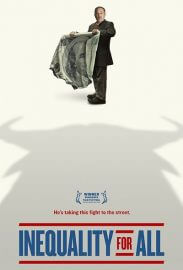Enjoy a free preview via Film Discovery! Click here !
Enjoy a free preview via Film Discovery! Click here !
Enjoy a free preview via Film Discovery! Click here !
Enjoy a free preview via Film Discovery! Click here !

https://www.filmplatform.net/product/inequality-for-all
“We make the rules of the economy – and we have the power to change those rules.” – Robert Reich
A passionate argument on behalf of the middle class, INEQUALITY FOR ALL features Robert Reich – professor, best-selling author, and Clinton cabinet member – as he demonstrates how the widening income gap has a devastating impact on the American economy. The film is an intimate portrait of a man whose lifelong goal remains protecting those who are unable to protect themselves.

It was quite a challenge, as a narrative filmmaker, to think about how I might approach a documentary about widening income inequality. As I thought about it more, however, I realized my background could be a real asset. I decided my goal with this film, first and foremost, was to take a conceptual and abstract topic and find a way to tell an approachable and human story about it. Every choice – from letting Reich’s humor show through to approaching interview subjects as people rather than victims – was designed to help show the argument and the economy in human terms that people could wrap their heads around.
This approach was so important to me because economic inequality was a concept that I have always felt personally. I grew up knowing I was from a poor family because I got free school lunches – the scarlet letter a kid wears to let his classmates know his family is below the poverty line – all the way through school. My mother raised a family of four by herself on a salary that ranged from $9,000 – $15,000 a year. I remember all the day-to-day tough calls my mother had to make – medical insurance for her kids or groceries? – the pressure of which weighed on her every second of every day. I also remember how people looked down on us – we must not be worth much if we had worn clothes on or if we didn’t even have enough money to go to the mall or to get an ice cream.
My upbringing also led us to move around a lot. I started out in a rough neighborhood in New York City, went to high school in a farm town in rural Michigan when New York became too much for my mother to handle, and moved to California as an adult. All of this might surprise people who know me now. Education was my way out, and I don’t often call attention to my economically disadvantaged roots. But I never forgot where I came from, and I was always keenly aware of who had what in society.
Cut to today. My hope in making this film was that I would be able to take all of those experiences and use them to help make a film that a wide variety of people can connect to. I have lived among the most conservative and liberal people in America, in urban and rural communities across this amazingly diverse country, and have experience dealing with billionaires and homeless people and everything in between.
I believe my somewhat unconventional background has provided great preparation for the goal of the film: to find a human way in to an idea-driven film. I believe America could use a discussion about the future of the middle class and widening income inequality, but not in purely partisan terms. I think we’ve had enough of that. The film I hope we made is one that educates at the same time it inspires, and speaks to what we can hope for to make America better. That large, idea-driven story, for me, is as personal as it gets.
We’re in the biggest economic slump since the Great Depression, and we can’t seem to get out of it. Why? Because, exactly as in the 1920s, so much of the nation’s income and wealth are going to the top, that the vast middle class doesn’t have the purchasing power to keep the economy going.
I’ve spent most of my working life concerned about what’s happening to American workers – their jobs, their wages, their hopes and fears. My father sold clothing to the wives of factory workers in the late 1940s, 1950s, and 1960s. I watched as the factories began to close, and as those families struggled with a new economy. Households kept their living standards by sending those wives and mothers into paid work – a strategy that did the trick for a time. But when it no longer generated enough income, American families went deeper and deeper into debt – and that’s been the vicious cycle most middle class Americans have been in ever since.
People are stressed. They’re angry and frustrated, and the tide is only rising on that front. Their debt obligations are staggering, yet (if lucky enough to have a job), they’re working harder and longer than ever before. People need to understand what’s happening to them – because from their perspective, the picture looks pretty bleak.
Until we can take a step back and understand the big picture, we can’t do anything to get ourselves out of this mess. Our democracy as we know it depends on it. I’m an educator. I love the classroom. But I also write books, appear on television and on the radio, and do everything else I can do to help people understand the economic truth. It’s my life’s work and it’s more important than ever. One of the best ways to help people understand the challenges we face, is with a movie that can grab an audience and move them to action.
And this movie will do exactly that.